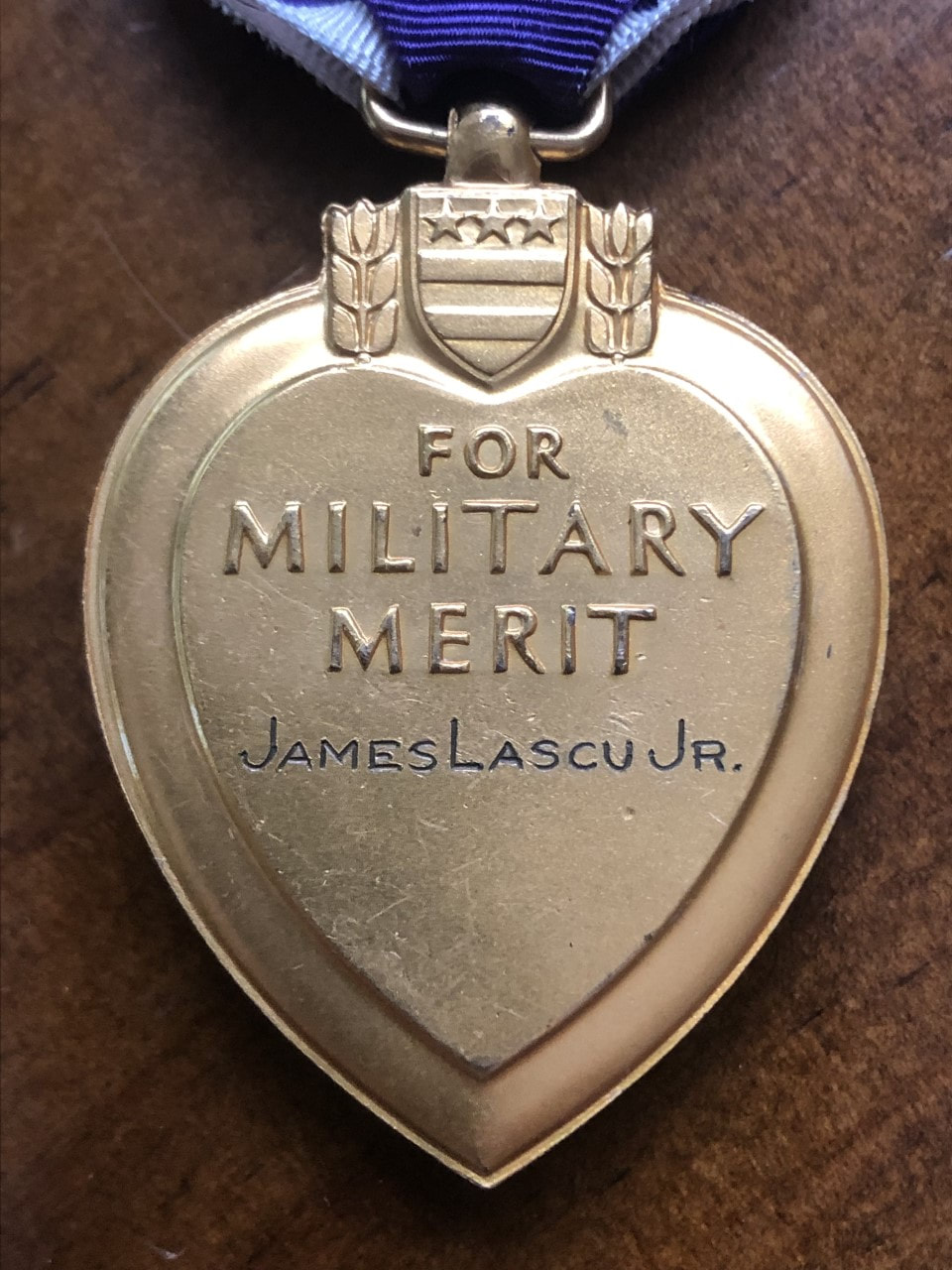Sargeant James Lascu, Jr. - 324th Bomber Squadron
The crew of "Ritzy Blitz". Lascu is shown in the back row, far left.
James Lascu, Jr. was born in Canton, Ohio on January 11, 1914. The son of Rumanian immigrants from the Austro-Hungarian Empire, he registered for the draft at the age of 26 and ultimately became a Radio Operator in a B-17F (“Ritzy Blitz”), with 324th Bomber Squadron, 91st Bomber Group. On January 11, 1944, Lascu and his crew of ten (led by pilot Wayne D. Hedglin) departed on a raid on Oschersleben, in central Germany, for an attack on its aircraft factory and surrounding facilities. It was the plane’s 48th combat mission but only the second or third for much of the crew. Approximately 177 planes were dispatched from England for the raid with a further 114 dispatched for secondary or diversionary targets at Halberstadt. “Ritzy Blitz” was among the lead planes within its unit and saw heavy opposition as soon as it crossed the German coast. The formation was jumped by up to 400 German aircraft, a collection of Bf 109s, Fw 190s, and Me110s which turned out to be greatest concentrated attack on an Allied strike force since the Schweinfurt mission of August 17, 1943. The Germans ripped through the formation with machine gun and 20mm cannon fire, in some cases up to eight panes abreast, causing heavy casualties amongst the lead planes.
“Ritzy Blitz” was attacked by up to twenty fighters and took hits to one of its engines as well as its main fuselage, where cannon fire reportedly exploded within the radio room compartment. With the controls of the aircraft destroyed, it went into a tailspin and a number of the crew were able to bailout. Some were stuck in the aircraft due to the force of its spinning, while others were likely already dead. Lascu, was probably killed by the explosion or explosions in the main fuselage fell with the aircraft. Overall, only five of the crew survived but were taken prisoner by the Germans (one crewmember bailed out but his parachute failed to open and he was killed). The remainder of the crew crashed with the plane in the vicinity of Wennigsen, a small town located ten to fifteen miles southwest of Hannover. Its unexploded bombs also fell and exploded across the countryside. Lascu and his remaining crew were buried by a civilian, or civilians, in a local cemetery, on January 13th or 14th. His body was ultimately moved to the American War Cemetery in the Ardennes.
On March 6, 1944 Lascu’s mother received a telegram confirming that her son, previously reported as Missing in Action, was confirmed dead by the International Red Cross. In recognition of his death, Lascu was posthumously awarded the Purple Heart. His medal was officially engraved, and sent home.
“Ritzy Blitz” was attacked by up to twenty fighters and took hits to one of its engines as well as its main fuselage, where cannon fire reportedly exploded within the radio room compartment. With the controls of the aircraft destroyed, it went into a tailspin and a number of the crew were able to bailout. Some were stuck in the aircraft due to the force of its spinning, while others were likely already dead. Lascu, was probably killed by the explosion or explosions in the main fuselage fell with the aircraft. Overall, only five of the crew survived but were taken prisoner by the Germans (one crewmember bailed out but his parachute failed to open and he was killed). The remainder of the crew crashed with the plane in the vicinity of Wennigsen, a small town located ten to fifteen miles southwest of Hannover. Its unexploded bombs also fell and exploded across the countryside. Lascu and his remaining crew were buried by a civilian, or civilians, in a local cemetery, on January 13th or 14th. His body was ultimately moved to the American War Cemetery in the Ardennes.
On March 6, 1944 Lascu’s mother received a telegram confirming that her son, previously reported as Missing in Action, was confirmed dead by the International Red Cross. In recognition of his death, Lascu was posthumously awarded the Purple Heart. His medal was officially engraved, and sent home.


